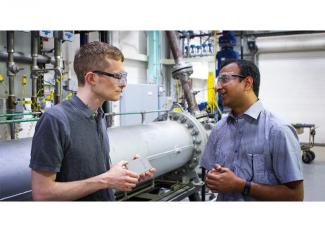Innovative and reliable energy conversion systems are at the heart of America’s evolving energy infrastructure. They allow for the production of power, fuels and chemicals from both fossil fuels and renewable sources to provide the electricity that powers nearly every aspect of our daily lives. NETL’s role in advancing these systems ranges from designing novel experimental modeling tools to testing more efficient solutions to generating power and materials in ways that reduce environmental impact. In 2020, these advancements helped reduce time, cost and technical risk while enabling efficient operation to drive the energy systems of the future.
The Lab’s energy conversion engineering research is helping discover what devices advanced energy systems should comprise and how those devices can best work together. For instance, NETL’s Thermal Sciences Team is currently working on integral components for a highly reliable combined heat and power (CHP) system that operates with greater efficiency than current methods. The CHP system works by generating electricity and capturing heat that would otherwise be wasted to provide useful thermal energy, which enables buildings to use less fuel and release fewer emissions into the atmosphere. The Lab’s Advanced Turbine Airfoils for Efficient Combined Heat and Power Systems project is evaluating how new airfoil cooling designs, new materials and additive manufacturing technologies can raise the efficiency of turbines used in CHP systems, which could help lower the utility costs of important institutions such as universities and hospitals. Team members are currently identifying the most promising additive manufacturing materials to use in construction, with projected work in 2021 to include the testing of preliminary airfoil designs.
Additionally, NETL partnered with other federal agencies in 2020 to advance rotating detonation engine (RDE) technology, which is more mechanically simple than a traditional combustion engine and can achieve much greater efficiencies. The Lab’s RDE breakthroughs this year included optimizing RDE functionality alongside a gas turbine, developing a water-cooled rig that allows for longer run time, determining real-time measurements of nitrous oxide emissions and more. All of these developments are of high interest to the newly created National Rotating Detonation Engine Council, which facilitates information exchange, investment coordination and strategic collaboration in RDE technology across government agencies.
One promising new research area NETL scientists are investigating in the new decade is magnetohydrodynamic (MHD) power generation, which has benefits ranging from improved efficiency for fossil fuel power plants to reducing the costs of implementing carbon capture. MHD generation works by taking direct kinetic energy from fast-moving ionized gases and converting it into electricity without the use of any moving parts. NETL’s MHD Lab in Albany, Oregon, broke new ground this year in ultra-high-temperature MHD generator technologies that incorporate new, innovative ceramics designed to operate above the boiling point of potassium metal, a common ionization aid for MHD systems. With new technological advancements, NETL researchers are pushing past previous limitations that previously hindered advancement, and research in this relatively new field is slated to continue.
Efficient energy conversion technologies often require high-heat, high-pressure operating environments. However, the sensors and diagnostic instruments that assist these technologies must also be able to withstand the same environment without melting or malfunctioning. In August 2020, researchers in NETL’s Fundamental Combustion Laboratory recently developed advanced diagnostic techniques that are capable of providing accurate, real-world data to validate models of next-generation fossil fuel and combustible renewable (i.e., hydrogen) technologies like direct power extraction (DPE) systems and RDE, which both operate best using extremely high temperatures. DPE and RDE technologies share the ability to realize much higher gains in efficiency than current combustion technologies and could increase efficiencies by 5-10%. Diagnostic information for these relatively new technologies is integral in developing improved models and could change the way power producers create energy in the future.
This important research, alongside NETL’s numerous other areas of expertise, seeks to discover, integrate and mature technology solutions to enhance the nation’s energy foundation and protect the environment for future generations. Learn more about the Lab’s Energy Conversion Engineering competency here.
NETL is a U.S. Department of Energy national laboratory that produces technological solutions for America’s energy challenges. From developing creative innovations and efficient energy systems that make coal more competitive, to advancing technologies that enhance oil and natural gas extraction and transmission processes, NETL research is providing breakthroughs and discoveries that support domestic energy initiatives, stimulate a growing economy, and improve the health, safety, and security of all Americans. Highly skilled men and women at NETL’s sites in Albany, Oregon; Anchorage, Alaska; Houston, Texas; Morgantown, West Virginia; and Pittsburgh, Pennsylvania conduct a broad range of research activities that support DOE’s mission to advance the national, economic, and energy security of the United States.




